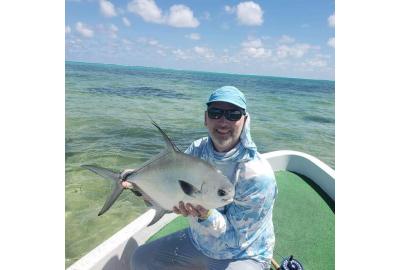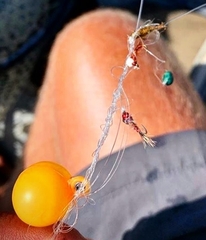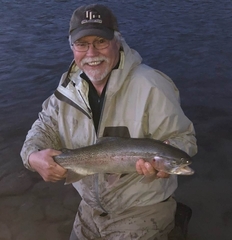After you have a year or two of fly fishing under your belt you will probably start to think of either buying a second rod for different situations or upgrading your current rod. A lot of beginners will start out with a fly fishing combo, rod, reel and line, which nowadays are quite good quality and the rod might last you for years. Or it may be a hand me down rod from Dad or Grandpa. These are often more valuable as keepsakes rather than rods you will enjoy fishing with.
Regardless of the reasoning behind your desire to purchase a replacement rod or additional rod the hopefully the following will help with your decision. When buying a new rod you should always cast it before buying, whether it be in the fishing shop parking lot, the casting pond at a sports show or if you are lucky enough on the water using a friends, guides or shop loaner. Over the years I have seen hundreds of people come into the store pick up a rod that they had predetermined to be the one, waggle it once or twice and buy it, only to be disappointed in the end result. Those that test cast them, along with others of similar cost/length/action very often change their mind after casting them both.
You can never have enough fly rods
If you are simply upgrading your existing fly rod you should ask yourself what you would like to be do better or differently, cast further, cast more accurately, cast hiresger flies, smaller flies, fish hiresger waters, smaller waters. Then set a budget, the price range has increased dramatically over the last few years, then do some research. If you are looking to add to your arsenal with a different weight of rod then you probably have a pretty good idea as to whether you want to go a couple of line sizes larger, hiresger flies, hiresger water, hiresger fish. Or if you want to go a couple of line sizes smaller, more delicate presentation, smaller water, increased fun fighting fish. Rods have progressed so much over the years, 7 weight rods were once the starter weight, then 6 weights for awhile, now 5 weights can do everything that the old 7 weights did, even better and have taken over as the rod weight of choice. When purchasing your second rod, assuming your happy with your first one, stay two line weights away. A 3-5-7 or 4-6-8 weight selection will give you a lot of versatility and you will be able to fish anything from small stream brook trout to bonefish in Saltwater.
Smaller rods work well for smaller streams
Every fly rod has a weight designation given to it for the "ideal" fly line weight they will cast. The line weight is a designation for what the line actually weighs over the first thirty feet, therefore the higher the number the heavier the line and the larger the rod. Matching the line and rod weight to the conditions you will be fishing will make for more enjoyable outings. An 8 weight Flyline crashing down into a gentle spring creek isn’t going to catch near as many fish as a gently delivered 3 or 4 weight will. Vice versa you will struggle to even cast a large pike fly that has half a rabbit lashed on to a 3/0 hook with a 4 weight rod.
Moderate action rods work better for throwing nymph rigs
The length of your new rod will also be a consideration. While 9’ rods would be considered the norm these days there is a case for longer or shorter rods. If you plan on fishing larger rivers and will be doing lots of mending a longer rod of 9 1/2’ or 10’ should be considered. Longer rods can also be helpful when fishing from a boat or float tube where you are closer to the water. The extra length will help you keep your line up off of the water. Shorter rods, 7-8' are better for short accurate casts, and they will also help keep the fly out of the streamside vegetation and overhanging branches.
A shorter rod can help you in tight quarters on small streams
Your casting skill is an important consideration when choosing the action of your next fly rod. Many of today’s rods are very fast action which makes them very hard for the beginner or intermediate fly fisher to use. A slower to intermediate action rod is much easier to cast and helps act as shock absorber on the strike and while fighting fish. Many older anglers, myself included, prefer intermediate action actions rods for those reasons, plus when we started out all the rods available to us were what would be considered slow action by today’s standards. It is important not to get caught up in the hype of the faster is better craze that has gone on for the last few years, many anglers will benefit from a more moderate action rod. Also it is important not to assume that every rod a manufacturer makes will be the same action. I fished with a friend who was new to the sport, he was casting quite well but struggled when we started using two bead headed nymphs and strike indicators.
He took a break and watched me fish for awhile and said I made it look easy.
He then asked to try my rod, which while from a high end rod maker was one of their moderate action rods, his casting immediately improved and he vowed that this was going to be his next purchase, a rod from this manufacturer. Fast forward a month and we are back on the river again, he had indeed purchased the high end rod and yet he struggled even more with it than his original. Upon inspection I quickly knew what the problem was, the model was one of their fastest model and not the right choice for his ability or the type of fishing we were doing.
The right size rod for the job gets it done
In conclusion do your homework, set a budget and test cast your choices. This will help make your next rod purchase decision a good one. There will always be all sorts of hype and advertising out there that touts faster stiffer fly rods, and they do have a place, but for the beginner to intermediate angler a well built moderate action rod will be much more pleasant to fish with help make your days on the water much more enjoyable.







